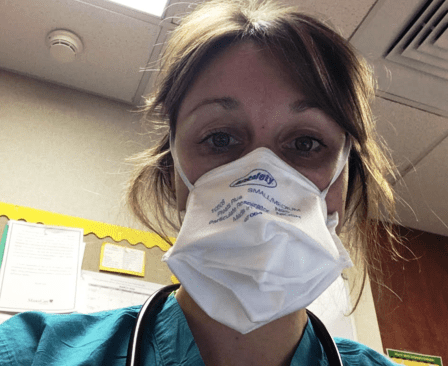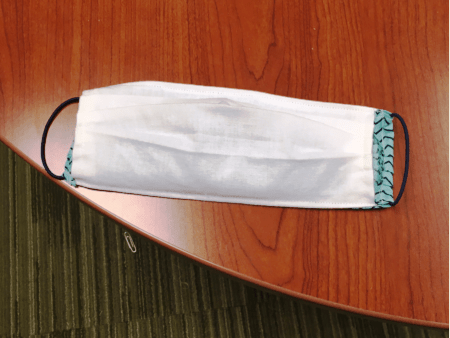
As Supplies Dwindle, One Washington Doctor Gets Creative To Hustle Masks
READ ON
In these times of uncertainty and upheaval amidst a global pandemic, Dr. Jessica Van Fleet-Green had reason to celebrate recently.
After three weeks of wearing the same N95 mask on her rounds at ManorCare of Lacey, a 120-bed nursing home near Olympia where she’s the medical director, she had managed to acquire a new mask.
“[F]eeling fresh as a daisy in a brand new stylish mask that was donated!” Van Fleet-Green wrote in an Instagram post featuring a photo of herself in the mask.
Over the previous weekend, Dr. Van Fleet-Green had rounded-up 200 masks for her team – a mix of the more protective N95s and standard surgical masks. The donations came from a dental office that’s now closed because of the coronavirus pandemic, two construction contractors and even her father who found two at home.

Dr. Jessica Van Fleet-Green posted this selfie to Instagram after she received a new N95 mask after three weeks of using her old one.
“Are you really hustling masks?” she recalled him asking. “Yes, I’m hustling masks because I don’t have any and we have to protect ourselves.”
The donations came at a critical time. Dr. Van Fleet-Green said the nursing home was down to a one-to-two day supply.
Earlier this month, Gov. Jay Inslee ordered nursing homes to cease allowing visitors in an effort to keep COVID-19 out of facilities with vulnerable populations. At ManorCare of Lacey, Dr. Van Fleet-Green said the greatest risk now is that a staff member will bring the virus into the facility. That’s why, in recent weeks, she’s had a personal policy of wearing a mask at all times inside the nursing home. As of this week, she said, it’s a mandatory policy for all of the roughly 100 staff at the facility.
If COVID-19 does come into a nursing home, the results can be devastating. Witness what happened at the LifeCare Center of Kirkland where an outbreak of the virus claimed 35 lives. Currently, the race is on to contain another outbreak at the Shuksan Healthcare Center in Bellingham where nearly 40 residents and staff have tested positive.
According to the latest tally from the industry, there are 151 confirmed and suspected cases of COVID-19 in Washington nursing homes, assisted-living facilities, senior living facilities and adult family homes. As of Friday, Washington reported 175 COVID-19 deaths and a total of 3,700 confirmed cases across 34 of the state’s 39 counties.
So far, there’ve been no COVID-19 cases at ManorCare of Lacey, but Dr. Van Fleet-Green said they’ve had a couple of “fire drills” where they thought a resident might have the virus.
“It is adrenaline-driven type of medicine, that’s for sure,” she said. Staff are acutely aware that even one case can be difficult to contain and potentially deadly.
Despite the heightened risk novel coronavirus poses to residents of nursing homes, facilities like ManorCare that have had no diagnosed COVID-19 cases are a low priority to get PPE from the state. According to guidance announced by the Washington Department of Health on March 21, hospitals, first responders and others come first.
But even those highest priority recipients are having a hard time getting what they need. The state has said it’s received only about 25 percent of the PPE it’s requested from the National Strategic Stockpile. The high demand and persistent shortages mean nursing home staff must beg, borrow and get creative to obtain the supplies they need.

Staff at ManorCare of Lacey bought a sewing machine and supplies and have started making their own masks to protect against the spread of COVID-19. Courtesy of Dr. Jessica Van-Fleet Green
“I never thought in my career that I would be posting something on social media asking for mask donations, that’s something that never crossed my mind,” said Van Fleet-Green.
Besides her social media pleas for donations, Dr. Van Fleet-Green said the staff at ManorCare of Lacey have also taken matters into their own hands. They recently took a trip to the fabric store where they bought a sewing machine, all the elastic they could find and yards of flannel. They also purchased operating room drapery, which is made of a similar material to paper surgical masks, and hair ties. The staff is now sewing homemade flannel surgical-style masks with a pocket where the drapery material can be inserted as a barrier.
“We can distribute those to our nurses so they can at least go home, launder it and put in a new insert,” Van Fleet-Green said.
Health care providers say it’s not surprising that individuals like Dr. Van Fleet-Green are having to scramble to get the protective gear they need.
“We have no single point of command to coordinate an effective response to marshall needed resources to defeat this virus,” said Robin Dale of the Washington Health Care Association and Deb Murphy of LeadingAge Washington, two leading nursing home industry associations in the state.
“Instead, states have been left to compete against each other for scarce supplies and, within each state, the health care system is competing against each other; hospitals against each other and against long term care providers,” the joint statement said.
For Dr. Van Fleet-Green the situation is “frustrating,” but she’s encouraged by the community response to try to help fill the gaps. She’s also savoring every small victory.
For instance, in her role as chief medical officer for Physicians of Southwest Washington, a group that represents independent doctors and medical practices, she recently contacted a Tacoma-based linen company – Superior Linen Service– in search of washable gowns.
It was a serendipitous moment. It turned out she knew the general manager, John McMasters, and not only did he have gowns in stock, he needed the business. His fifth-generation family company mostly serves the hospitality and restaurant industry and had lost 80 percent of its business with the closure of restaurants and bars.
They had a contract signed within 24 hours. The fluid-resistant gowns are now being distributed to independent physicians and clinics so doctors can be properly protected when testing patients for COVID-19.
“To be able to help those we can and keep our doors open is a fantastic feeling for our family,” McMasters said.
But even with all of these efforts, Dr. Van Fleet-Green said masks and gowns are still in short supply and donations are still desperately needed. She’s putting out the call to dentists, nail salons, construction contractors and anyone else who may have supplies of surgical or N95 masks to donate their reserves.
“We welcome any donations that you have,” Van Fleet-Green said.
Related Stories:

Why affordable housing providers say they’re facing an ‘existential’ crisis
Affordable housing providers across the Northwest have been contending with rising insurance premiums — and, in some cases, getting kicked off their plans altogether.

Pacific Northwest author’s new novel captures atmosphere of the region
On a gray, early spring morning, I drove to Steilacoom, Washington, to catch the ferry to Anderson Island. I boarded alongside the line of other cars and after parking, stepped out onto the deck of the boat. The ferry pushed off from the dock and rocked a little in the Puget Sound before steadying.
I took this journey to the real Anderson Island to see from the water what inspired Northwest author Kirsten Sundberg Lunstrum’s new novel, “Elita,” which was published earlier this year. Sundberg Lunstrum was inspired while sailing around the Puget Sound to write a mystery novel on an island.
Sundberg Lunstrum read excerpts of the book at a gathering at Tacoma’s Grit City Books.

Repentina suspensión de Head Start afecta a cientos de niños en el centro de Washington
Suspensión de los programas Early Head Start y Head Start afecta a siete Inspire Development Centers en el centro de Washington, dejando a más de 400 niños sin apoyo educativo después de que la financiación federal nunca llegara. También provocó el despido de más de 70 personas.












